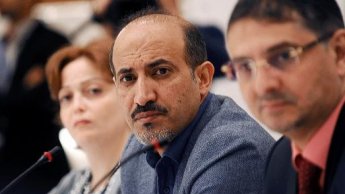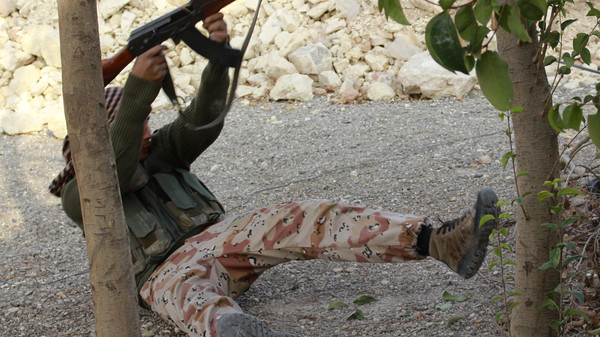www.aljazeerah.info
News, November 2013
Archives
Mission & Name
Conflict Terminology
Editorials
Gaza Holocaust
Gulf War
Isdood
Islam
News
News Photos
Opinion Editorials
US Foreign Policy (Dr. El-Najjar's Articles)
www.aljazeerah.info
|
Editorial Note: The following news reports are summaries from original sources. They may also include corrections of Arabic names and political terminology. Comments are in parentheses. |
Syrian Opposition Names Cabinet, Agrees to Geneva Talks, Regains Strategic Aleppo Base
November 13, 2013
Syrian opposition conditionally agrees to talks
November 12, 2013By FRANCE 24 (text)
After days of talks that stretched into the early morning hours Monday, Syria’s main Western-backed opposition agreed to attend planned peace talks in Geneva – if a number of conditions are met.
Following a vote early Monday in Istanbul, the Syrian National Council (SNC) released a statement repeating the opposition’s long-held demand that Syrian President Bashar al-Assad step down.
France 24's Jasper Mortimer in Istanbul "Elements in the West will be disappointed by the conditions."
“Bashar al-Assad will have no role in the transitional period and the future of Syria,'' said the statement.
Reporting from Istanbul, FRANCE 24’s Jasper Mortimer said there were two other preconditions to the SNC’s participation in the Geneva talks.
“The first one is humanitarian access. The [Syrian] government must allow food and medicine to get through to the communities trapped in a warzone and allow them to evacuate their wounded. Secondly, the government must release all detainees, particularly women and children,” said Mortimer.
But the key sticking point, Mortimer noted, is that Assad “must accept the London communiqué, which was issued last month”.
The London communiqué was issued following the October 2013 meeting of the so-called “London 11” – which includes the US, France, Britain, Germany, Egypt, Italy, Jordan, Qatar, Saudi Arabia, Turkey and the United Arab Emirates. The text of the agreement states that a transitional governing body should be set up and that Assad should have no role once this body is established.
The SNC agreement came a day after community elders from the Damascus suburb of Qudsaya said they managed to negotiate a temporary lifting of a government blockade to allow some food supplies into the area, which has been under a siege for a month.
A number of suburbs of the Syrian capital have been particularly hit by the civil war, with aid groups warning that millions of Syrians are in desperate need of humanitarian relief as the conflict continues to wreck a deadly toll. More than 100,000 people have been killed since the uprising against Assad began in March 2011 and millions have been displaced, according to the UN.
SNC stuck between a rock and a hard place
Monday’s agreement by the SNC to participate in “Geneva II” – as the talks are known in diplomatic circles – followed weeks of intense pressure by Western countries to get an agreement from the fractured Syrian opposition.
But as Assad continues to gain the upper hand in the conflict, Mortimer noted that the SNC has been stuck between a rock and a hard place.
“The West sees this conference as the only way to stop the slaughter,” said Mortimer. “At the same time the coalition has to face the fighters in the field who reject any negotiations with the government until Assad agrees to step down.”
But that scenario looks increasingly unlikely in a country that has been ruled by the Assad family for more than 40 years.
Assad’s government has rejected any preconditions for the conference in Geneva.
Last month, Assad told a Syrian TV station that he saw “no obstacles to being nominated to run in the next presidential election”.
Reporting from Istanbul, Mortimer said that “elements in the West will be disappointed by the [SNC’s] conditions, thinking that the [opposition] coalition has raised the bar too high”. But, he noted, “The fact is that these conditions were essential to hold the coalition together.”
No date has been set as yet for Geneva II. UN-Arab League envoy to Syria Lakhdar Brahimi has said he would meet US and Russian diplomats on November 25 to try to make arrangements for the much-awaited talks.
Western-backed Syrian opposition names cabinet for rebel areas
Al-Arabiya, Reuters, Istanbul/Amman --
The Syrian National Coalition named a provisional government for rebel-held areas on Tuesday, despite U.S. misgivings, members of the fractious Western-backed opposition grouping said in Istanbul.
Washington and its European allies hope a proposed peace conference in Geneva will produce an interim government that can help end the armed conflict raging in Syria since 2011 - a scenario they fear the coalition’s decision could disrupt.
“The United States is against the provisional government because it thinks it will undermine the Geneva talks,” said an opposition official who was involved in naming the cabinet.
“The feeling in the coalition is that even if Geneva convenes it will be a long process and we cannot continue to leave the liberated areas prey to chaos in the meantime.”
The coalition serves as a channel for Western support for the rebels, but its leaders are all outside Syria and their influence on disparate rebel factions is patchy at best.
According to the United Nations, some 40 percent of Syria’s population need humanitarian assistance. Polio has broken out and people in besieged areas may face malnutrition, but violence and red tape have obstructed aid efforts.
The opposition agreed on Monday to attend peace talks that Washington and Moscow are trying to convene in Geneva but said President Bashar al-Assad could play no part in Syria’s future.
The coalition official said it would be hard for the interim government to move to Syria immediately due to the risk of attack from Assad’s forces or al Qaeda-linked militants.
Recognition unlikely
He said the cabinet would probably operate from the Turkish border city of Gaziantep, north of the contested city of Aleppo.
In September, the coalition led by Ahmed Jarba appointed Ahmed Tumeh, a moderate Islamist, as provisional prime minister, even though U.S. Secretary of State John Kerry had called Jarba and asked him not to form a government, opposition members said.
They said the new cabinet was unlikely to win international recognition, but could attract money from Saudi Arabia, which has been at odds with Washington over Syria, and from foreign donors looking to channel humanitarian aid more efficiently,
Some Western nations, they said, were willing to use the government as an aid channel, without formally recognizing it.
French Foreign Minister Laurent Fabius, in a statement on Tuesday, welcomed the coalition’s decision to join the Geneva peace talks as “a major step towards a political solution.”
He said the formation of the interim cabinet showed the coalition’s “spirit of responsibility” and that France backed efforts to gain immediate humanitarian access to civilians.
Jon Wilks, the British envoy to the Syrian opposition, said forming the cabinet was “an important step” and that Britain was ready to help it deliver services and aid inside Syria.
Among the government’s main figures is Saudi-backed dissident Asaad Mustafa, who was named as defense minister. Asaad is a former agriculture minister in Assad’s government.
Ibrahim Mero, a Dutch-educated economist, was chosen as finance minister and Taghreed al-Hajlee, the only woman among the nine ministers, for the family and women portfolio.
No one was appointed to the interior, education and health ministries because nominees failed to win the support required.
Syrian daily criticizes government inaction in Aleppo
Tuesday, 12 November 2013
Al-Arabiya, AFP, Damascus
Al-Watan newspaper said the government of Prime Minister Wael al-Halqi
had failed to dispatch its economic team to Aleppo city. (Snapshot of
the newspaper's online version)
Syria's Al-Watan newspaper, considered close to the regime,
criticized the government on Tuesday for failing to better address the
devastation in the country's second city of Aleppo.
The rare
criticism comes as government troops make progress in Aleppo province,
retaking the town of Sfeira, southeast of Aleppo city and discussing the
possibility of reopening Aleppo's airport after nearly a year of
closure.
The newspaper said the government of Prime Minister Wael
al-Halqi had failed to dispatch its economic team to Aleppo city
“despite the invitation of the governor and the improvement in the
security situation, thanks to the sacrifices made by the Syrian army and
resistance of the residents in the face of terrorists.”
The
regime and its media outlets use the term “terrorists” for the
opposition.
Al-Watan said Electricity Minister Imad Khamis, who
visited Aleppo on Monday, “finally returned to the city a year after the
last visit by a minister.”
“The people want the government to
show more interest in their city. They are waiting for visits from the
prime minister and other ministers to examine the situation, which has
improved somewhat,” it added.
Once Syria's economic powerhouse,
the city of Aleppo in the north of the country has been devastated by
more than a year of fighting between rebel forces and regime troops.
Both the opposition and the regime control parts of the city, with
neither side able to make much progress despite months of fighting.
Syrian opposition fighters ‘regain strategic Aleppo base’
Saturday, 9 November 2013
Al Arabiya -
Syrian opposition fighters have recaptured a strategic base near
Aleppo’s international airport following a violent combat that killed
more than 50 people, a monitoring group said on Saturday.
Military
forces backed by fighters from Lebanese militant group Hezbollah
launched an assault outside Syria’s northern city on Friday morning and
had regained control of large parts of Base 80.
However, opposition fighters, along with al-Qaeda loyalists,
counter-attacked using Grad rockets against army troops, the Syrian
Observatory for Human Rights said.
They recovered all of the lost
ground, the Observatory said.
“As a result of the fighting, the
rebels and jihadists have retaken the parts of the base that were
captured during the day by the army,” the watchdog's director Rami Abdel
Rahman said, in statements carried by Agence France-Presse.
He
said the fighting had left at least 53 people dead, 33 on the rebel side
and 20 on the government side.
The rebels seized Base 80, which
provided the garrison for both Aleppo international airport and the
adjacent Nayrab military airfield, in February.
They failed to
capture either airport but civilian flights have been suspended since
the start of the year because of rebel fire.
The army has made
several advances east of Aleppo in recent days, including the recapture
of Sfeira, a town that had been under rebel control for a year.
(with
AFP)
Fair Use Notice
This site contains copyrighted material the
use of which has not always been specifically authorized by the copyright
owner. We are making such material available in our efforts to advance
understanding of environmental, political, human rights, economic,
democracy, scientific, and social justice issues, etc. We believe this
constitutes a 'fair use' of any such copyrighted material as provided for
in section 107 of the US Copyright Law. In accordance with Title 17 U.S.C.
Section 107, the material on this site is
distributed without profit to those
who have expressed a prior interest in receiving the included information
for research and educational purposes. For more information go to: http://www.law.cornell.edu/uscode/17/107.shtml.
If you wish to use copyrighted material from this site for purposes of
your own that go beyond 'fair use', you must obtain permission from the
copyright owner.
|
|
|
|
||
|
||||||




